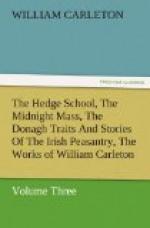“And what is Brady’s object in life?” I asked. “What does he intend to do.”
“Intend to do, is it? I am tould nothing less nor going into Trinity College in Dublin and expects to bate them all there, out and out: he’s first to make something they call a seizure; (* Sizar) and, afther making that good he’s to be a counsellor. So, sir, you see what it is to resave good schoolin’, and to have the larnin’; but, indeed, it’s Brady that’s the great head-piece entirely.”
Unquestionably, many who received instruction in this manner have distinguished themselves in the Dublin University; and I have no hesitation in saying, that young men educated in Irish hedge schools, as they were called, have proved themselves to be better classical scholars and mathematicians, generally speaking, than any proportionate number of those educated in our first-rate academies. The Munstor masters have long been, and still are, particularly celebrated for making excellent classical and mathematical scholars.
That a great deal of ludicrous pedantry generally accompanied this knowledge is not at all surprising, when we consider the rank these worthy teachers held in life, and the stretch of inflation at which their pride was kept by the profound reverence excited by their learning among the people. It is equally true, that each of them had a stock of crambos ready for accidental encounter, which would have puzzled Euclid or Sir Isaac Newton himself; but even these trained their minds to habits of acuteness and investigation. When a schoolmaster of this class had established himself as a good mathematician, the predominant enjoyment of his heart and life was to write the epithet Philomath after his name; and this, whatever document he subscribed, was never omitted. If he witnessed a will, it was Timothy Fagan, Philomath; if he put his name to a promissory note, it was Tim. Pagan, Philomath; if he addressed a love-letter to his sweetheart, it was still Timothy Fagan—or whatever the name might be—Philomath; and this was always written in legible and distinct copy-hand, sufficiently large to attract the observation of the reader.
It was also usual for a man who had been a preeminent and extraordinary scholar, to have the epithet Great prefixed to his name. I remember one of this description, who was called the Great O’Brien par excellence. In the latter years of his life he gave up teaching, and led a circulating life, going round from school to school, and remaining a week or a month alternately among his brethren. His visits were considered an honor, and raised considerably the literary character of those with whom he resided; for he spoke of dunces with the most dignified contempt, and the general impression was, that he would scorn even to avail himself of their hospitality. Like most of his brethren, he could not live without the poteen; and his custom was, to drink a pint of it in its native purity before he entered into any literary contest, or made any display of his learning at wakes or other Irish festivities; and most certainly, however blamable the practice, and injurious to health and morals, it threw out his talents and his powers in a most surprising manner.




